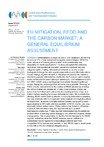Deforestation is a major source of CO2 emissions, accounting for around 17% of total annual anthropogenic carbon release. While the costs estimates of reducing deforestation rates considerably vary depending on model assumptions, it is widely accepted that emissions reductions from avoided deforestation consist of a relatively low cost mitigation option. Halting deforestation is therefore not only a major ecological challenge, but also a great opportunity to cost effectively reduce climate change negative impacts. In this paper we analyze the impact of introducing avoided deforestation credits into the European carbon market in the context of a EU policy aiming to reducing EU CO2 emissions by 20% wrt 1990 in 2020 using a multiregional Computable General Equilibrium model. Taking into account political concerns over a possible “flooding” of REDD credits, various limits to the number of REDD allowances entering the carbon market are considered. Finally, unlike previous studies, we account for both direct and indirect effects occurring on land, crops’ and timber markets resulting from lower deforestation rates. We conclude that allowing REDD credits trade is effective in reducing deforestation activities, has only moderate effects on land and timber markets and negligible effects on food prices. Moreover, it notably reduces climate change policy costs approximately by 80% with unlimited availbility of REDD credits and may drastically reduce carbon prices. Policy makers may, however, effectively control for this last effect tuning the supplementarity of avoided deforestation credits use. Finally, avoided deforestation has the additional positive effect of reducing carbon leakage of an unilateral European climate change policy. This is good news for the EU, but not necessarily for REDD regions. Indeed we show that REDD revenues are not sufficient to compensate REDD regions for a less leakage-affected and more competitive EU in international markets. In fact, REDD regions would prefer to free ride on the EU unilateral mitigation policy.
- issn: I18, I28
CMCC Divisions
Authors
- Keywords: 'Quality' dimension in population analysis, Education, Health, Human Capital, Root cause of development



